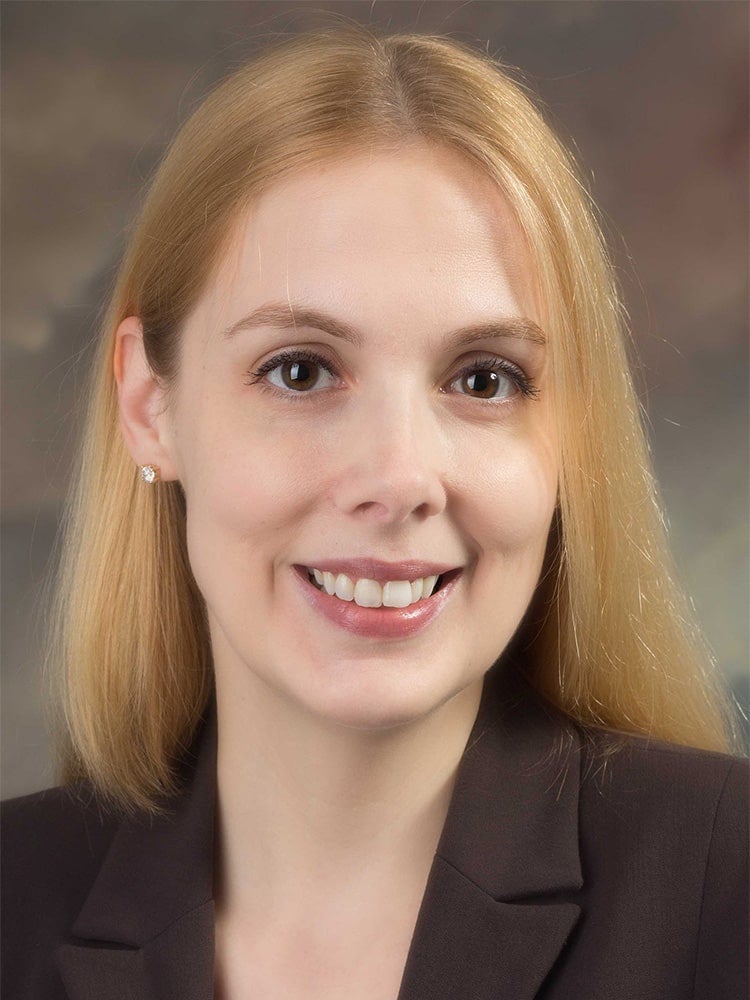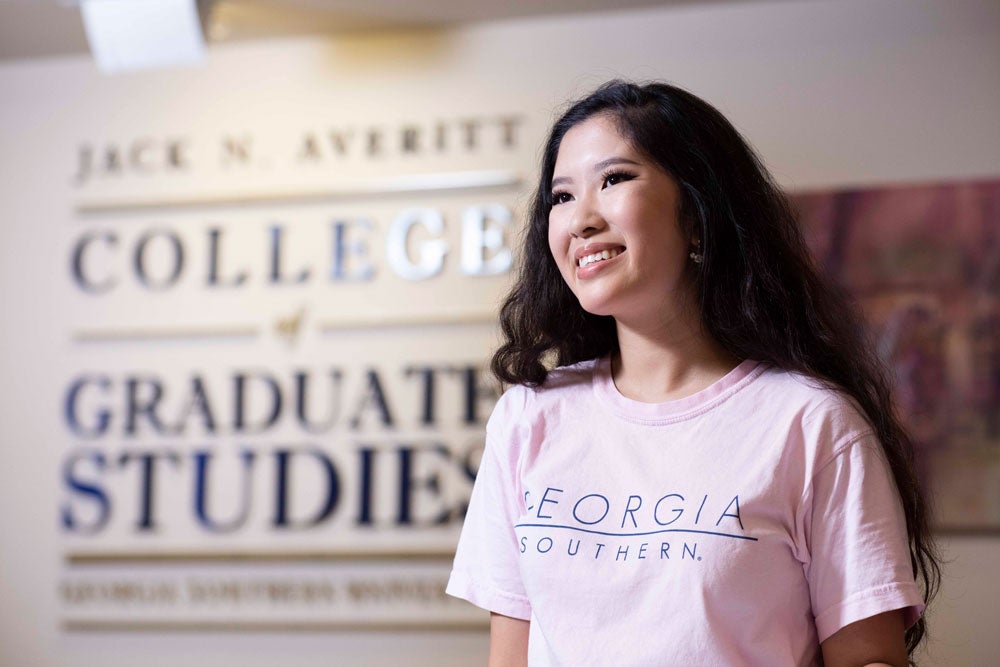Prepare to address the unique needs of underserved and rural populations through evidence-based approaches to mental health.
Locations
- Statesboro Campus (In Person)
Why Earn a PsyD at Georgia Southern?
- Prepare to seek licensure as a generalist practitioner in a growing career field.
- Train with a special focus on rural and underserved populations.
- It is possible to complete your studies tuition free with a graduate assistantship.
- Smaller program for dedicated faculty attention coupled with the resources of a large university.
- 112-124 credit hours to completion.
As conversations around health care access continue, one concerning trend has emerged: Rural and traditionally underserved populations have limited access to psychological services, resulting in acute demand for licensed practitioners. To close this gap, develop the skills and understanding required through the Doctor of Psychology (PsyD) program at Georgia Southern University.
You’ll receive comprehensive preparation to practice psychotherapy, conduct psychological assessments and provide consultative services to a spectrum of clients. To help you empower your future patients and advance the field through scholarship, this integrated program pairs in-depth coursework with extensive clinical practicum experiences, first beginning on campus in the Psychology Clinic, Georgia Southern University Counseling Center and the Regents Center for Learning Disorders and later with an agency primarily assisting rural clients. You’ll also develop as a researcher, joining faculty projects and contributing your own original ideas through a dissertation.
Students in the program have experienced a 100% placement rate into APA/CPA-accredited internships over the past eight years and a licensure rate of over 96%, finding rewarding opportunities in private practices, outpatient clinics, hospital settings, college counseling centers and community mental health centers.
Ready to Apply?
What Can You Do With a Doctorate in Psychology?
Earning your license qualifies you to practice as a generalist psychologist, including delivering effective psychotherapy, assessment and consultation services in rural and other settings. Outside of one-on-one patient sessions, the program’s emphasis on original, publishable research positions you for similar roles in government agencies or as a professor at the university level, where you’ll expand the field’s knowledge and pioneer new ways to address mental health challenges. Since the program’s inception, 89% of eligible PsyD graduates have become licensed psychologists.
Where our graduates work:
- Clinics and hospitals
- Community centers
- Correctional facilities
- Government agencies
- Mental health facilities
- Private practices
- Research organizations
- Schools
What our graduates do:
- Clinical psychologist
- Family therapist
- Forensic psychologist
- Professor
- Psychotherapist
- Research psychologist
What You’ll Learn
The PsyD curriculum weaves together courses on theory, clinical skills training, and practicum experiences to gradually build your knowledge and proficiency as a practitioner. You’ll study the scientific, methodological and theoretical foundations of clinical psychology, including the nuances of assessment and the planning of evidence-based interventions.
Practicum experiences include placements focused on care for underserved populations in the third year and on professional development in the fourth. An in-depth research project culminating in a dissertation ensures that you’ll develop research skills at the highest level. Finally, a year-long clinical internship in your final year integrates your knowledge and prepares you for licensure.
See the CurriculumBuild Your Experience
Add clinical and research skills to your knowledge of psychology, preparing to serve as a skilled practitioner and contributor of original insights to the discipline.

Practicums
Develop your clinical skills along with your studies in a series of three targeted practica, including an agency placement during your third year where you’ll primarily assist rural clients.

Internship
Your training culminates in a full-time, year-long clinical internship during which you’ll gain experience and confidence in assessment, psychotherapy, and consultation while working closely with a supervising mentor.

Research
Working under the guidance of a faculty member, you’ll gather and analyze data to answer an original research question, presenting your findings in a dissertation and through an oral defense.
Want to Learn More?
Explore essential information about our Psy.D. program, including application details, accreditation status, and licensing disclosures. Gain insight into the program’s credibility and requirements to help you start your journey toward success with the knowledge you need.
The PsyD program is open to those with a bachelor’s degree from a regionally accredited institution with a cumulative GPA of at least 3.30 (on a 4.0 scale). For the Fall 2022 class, the average undergraduate GPA of successful applicants was 3.76.
Applicants must have earned a minimum of a “B” in psychological statistics, research design, and abnormal psychology.
You must also have taken courses in at least two of the following areas:
- Personality
- Social psychology
- Developmental psychology
- Learning and/or cognition
- Health psychology
- Tests and measurement
- Theories of psychotherapy
- Psychology of substance abuse
To apply, please submit:
- An online application. (There is a $50 non-refundable application fee.)
- A written statement of professional goals. Please describe why you want to pursue doctoral training in clinical psychology. Also, explain how Georgia Southern University’s program is a good fit. Finally, please list three Statesboro campus psychology faculty whose research interests are a match to your own. Of these three, please include at least one clinical faculty member and one faculty member who is not clinical. This statement should be 500 words or less in length.
- Three letters of recommendation from former professors or appropriate employers/advisors.
- A curriculum vitae or résumé.
- Transcripts for all prior college- and graduate-level work. Copies can be uploaded with your application; official copies sent directly to the Office of Graduate Admissions will be required for admitted students.
- An interview is required. Interviews for Fall 2025 admission will be held in mid-February 2025. All interview activities will be via video conferencing or another remote means. The program will notify applicants selected for an interview in mid-January.
- (Optional) Official GRE scores.
- (Optional) A writing sample of prior work to showcase your writing skills, tone and style. The sample should be no longer than two double-spaced pages. Consider submitting an excerpt or passage from a research paper or writing assignment for class, a manuscript or other relevant works.
International transcripts must be evaluated by a NACES-accredited evaluation service. The evaluation must be course by course and include a GPA.
Application Deadlines
All students admitted to the program begin in the fall semester. The application deadline is December 15.
Your application and all required documents must be received by the deadline.
Additional Considerations
Given the ongoing demand for doctoral-level training in professional psychology and the limited number of students that we admit per year, admission to the PsyD program is expected to be quite competitive. The PsyD program enrolls eight students each year.
To earn a PsyD at Georgia Southern University, students must satisfactorily complete a minimum of 112 credits of coursework (a minimum of one year, 12 continuous months of full-time coursework must be done in residency at Georgia Southern) and three years of practicum assignments, pass the Clinical Qualifying Examination (CQE) (written and oral components), complete a dissertation and complete a 12-month (2000-hour) clinical internship. The dissertation proposal and CQE must be defended before the student may apply for an internship. The standard timeline for completion of the PsyD is five years (including the 12-month internship).
Although academic background, intellectual potential and professional experience and skills will be key selection criteria, we intend to recruit students who are committed to providing service with predominantly rural and underserved populations. Therefore, students should carefully consider their interest in rural and underserved populations before applying to the program. Applicants will only be considered for admission to the PsyD program (i.e., students will not be admitted for a terminal master’s degree in clinical psychology).
Transfer of graduate courses from other institutions: Students may receive credit for graduate courses taken at a regionally accredited institution during the last five years. A maximum of 18 hours of graduate-level coursework is allowed. All decisions on exempted courses lie with the Clinical Training Committee and require any student desiring course transfer to provide documentation (e.g., syllabi, tests, and grades) from the previous course.
Credit will not be given for clinical courses, with the exception of Assessment I: Psychometric Theory (PSYC 7231) and Assessment II: Intellectual Assessment (PSYC 7234).
Students wishing to be exempted from or to transfer in these courses must demonstrate proficiency as determined by the Clinical Training Committee. Course equivalencies will be determined on a case-by-case basis. Any course deficiencies will need to be completed with attention to course sequences and prerequisites before a degree can be awarded.
Part-time admission: The PsyD program is designed to be a full-time program completed in five years. However, we realize some students may desire to do a portion of the program part-time. Students may be admitted to the program with part-time status. The following criteria must be met:
- Students must apply via the same admission procedures as full-time students;
- Students can only begin the program in the Fall semester; and
- Students must be admitted with a minimum of 18 hours of course credit in non-clinical courses (i.e., they must enter the program with the maximum amount of transfer credit).
Once admitted, part-time students must:
- Enroll in a minimum of six credit hours of coursework each semester;
- Be enrolled in the program every semester, unless a Leave of Absence is granted;
- Enroll in necessary co-requisite courses when they are required;
- Enroll in Foundations of Psychotherapy I, II, and Group Psychotherapy (PSYC 7232, 7433, and 7235) in consecutive semesters;
- Switch to full-time enrollment (minimum nine credit hours per semester) for at least one full year to meet the residency requirement; and
- Complete the PsyD program within the eight-year time limit allowed for all students.
Contact Information
C. Thresa Yancey, Ph.D.
Director of Clinical Training, Professor of Psychology
psyd@georgiasouthern.edu
912-478-5704
The PsyD program at Georgia Southern University is accredited by the Commission on Accreditation of the American Psychological Association. Questions related to the program’s accredited status should be directed to the Commission on Accreditation:
Office of Program Consultation and Accreditation
American Psychological Association
750 1st St., NE, Washington, DC 20002(202) 336-5979 | apaaccred@apa.org | www.apa.org/ed/accreditation
As part of the National Council for State Authorization Reciprocity Agreement (NC-SARA), Georgia Southern University is required to notify all prospective and currently enrolled students whether they will be eligible for licensure and/or certification in their home state upon completing their Georgia Southern PsyD degree program.
The College of Behavioral and Social Sciences’ Department of Psychology anticipates that graduates of this program may seek state licensure as a Psychologist, Clinical Psychologist, Registered Psychologist, Psychological Examiner, Licensed Psychologist, Applied Psychologist, or Psychological Assistant.
The Department of Psychology has determined that the required classes and educational activities of this academic program, which is accredited by the APA, may not fulfill the educational requirement for licensure in all states. Each state/province has unique requirements to obtain licensure, but all require a doctoral degree in the field and a record of taking the Examination for Professional Practice in Psychology (EPPP — passing scores vary by jurisdiction). Some jurisdictions have other requirements, such as state jurisprudence exams, and most require supervised clinical practice after the doctoral degree is awarded (postdoctoral training). In addition, some states require a degree from an APA-accredited program. The PsyD program at Georgia Southern University is accredited by the APA. Questions related to the program’s accredited status should be directed to the Commission on Accreditation:
Office of Program Consultation and Accreditation
American Psychological Association
750 1st St., NE, Washington, DC 20002
(202) 336-5979 | apaaccred@apa.org | www.apa.org/ed/accreditation
More resources are available at the following websites:
http://www.asppb.net/?page=BdContactNewPG
https://www.asppb.net/page/CandHandbook
https://www.apa.org/gradpsych/2004/01/get-licensed.aspx
There are four graduate assistantships (GAs) available in the Department of Psychology for incoming students each year. The other incoming students can apply for GAs in various departments on campus.
All GAs (regardless of whether they are in the Department of Psychology or in other departments) include a stipend and a full tuition waiver (including out-of-state tuition) in exchange for 20 hours of work per week. Students are still responsible for university fees.
Files for Most Recent Cohort
Fall 2024
- PsyD Program Student Handbook (2024)
- Clinical Qualifying Exams Manual (2024)
- Dissertation Manual (2024-2025)
- Course Sequence (2024)
- Practicum Manual (2024-2025)
- Profession-Wide and Program Competencies and Discipline-Specific Knowledge
- Proposed Timeline
- Presentation/Publication Policy
- Symposium/Professional Development Training Policy
- Diversity and Multicultural Statement
- Program Sanctioned Hours
- Documentation of Personal Therapy Form
- Program Attendance Policy
- AI Policy
- Telehealth/Telesupervision Policy
Files for Previous Cohorts
Fall 2023
- PsyD Program Student Handbook (2023)
- Clinical Qualifying Exams Manual (2023)
- Dissertation Manual (2023-2024)
- Course Sequence (2023)
- Practicum Manual (2023-2024)
- Profession-Wide and Program Competencies and Discipline-Specific Knowledge
- Proposed Timeline
- Symposium/Professional Development Training Policy
- Program Sanctioned Hours
- Documentation of Personal Therapy Form
- Program Attendance Policy
Fall 2022
- PsyD Program Student Handbook (2022)
- Clinical Qualifying Exams Manual (2023)
- Dissertation Manual (2022-2023)
- Course Sequence (2022)
- Practicum Manual (2022-2023)
- Profession-Wide and Program Competencies and Discipline-Specific Knowledge
- Proposed Timeline
- Symposium/Professional Development Training Policy
- Program Sanctioned Hours (2022)
- Documentation of Personal Therapy Form
Fall 2021
- PsyD Program Student Handbook (2021)
- Clinical Qualifying Exams Manual (2021)
- Dissertation Manual (2021-2022)
- Course Sequence (2021)
- Proposed Timeline (2021)
- Program Sanctioned Hours (2021)
- Documentation of Personal Therapy Form (2021)
Fall 2020
Fall 2019
Links
Student Health Insurance Program (SHIP)
Guidelines and Checklist
Institutional Review Board – Research Compliance
Degree Forms
Graduation Checklist (COGS)
College Affordability Guide
Faculty Feature
With specialized training in dialectical behavior therapy, Professor Amy Luna directs the Psychology Clinic, where she plays a leading role in mentoring PsyD students as they take their first steps in clinical practice.
Learn More

Take the Next Step
Understand how to provide evidence-based psychological care to populations most in need with a PsyD from Georgia Southern.
Contact the Department of Psychology
Statesboro Campus
Brannen Hall, 1010
P. O. Box 8041
Statesboro, GA 30460-8041
Phone: 912-478-5539
Fax: 912-478-0751
Email: tboyer@georgiasouthern.edu
Armstrong Campus
Science Center, 201
Savannah, GA 31419
Phone: 912-344-2762
Email: jlwilliams@georgiasouthern.edu

